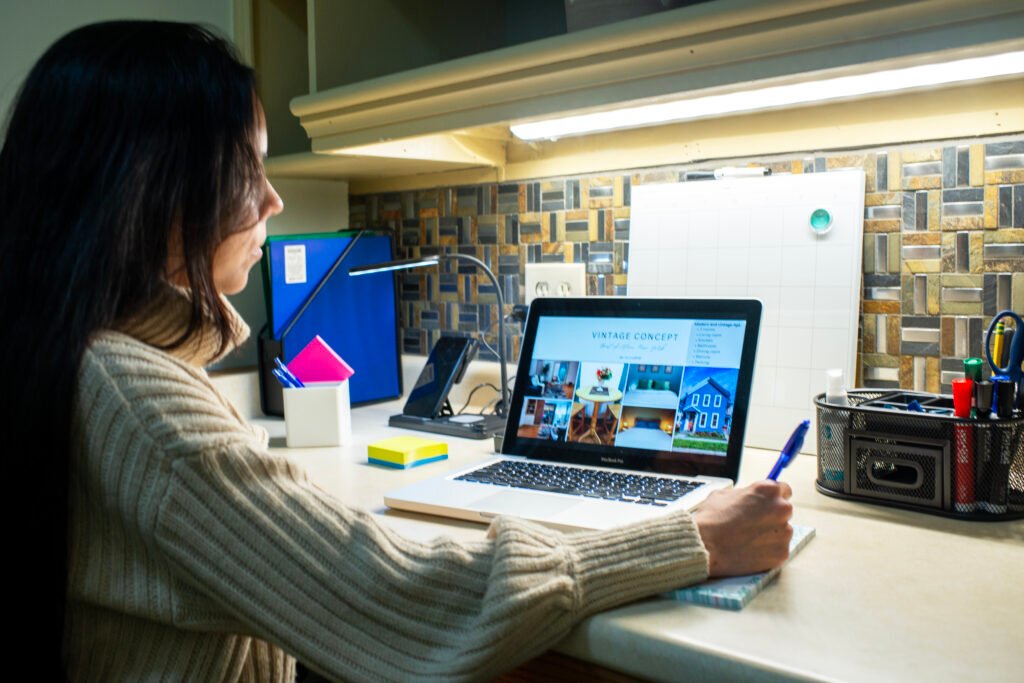Ever wondered how ordinary homeowners are transforming their properties into lucrative cash machines without leaving their day jobs? Airbnb hosting has revolutionized the way people earn vacation rental income, offering an exciting opportunity to monetize your living space.
The world of Airbnb hosting opens up incredible possibilities for property owners seeking to earn money rent your house on Airbnb. Whether you have a spare room, vacation home, or entire property, the potential for generating additional income has never been more accessible.
This comprehensive guide will walk you through the essential steps of becoming a successful Airbnb host, revealing insider strategies to maximize your earnings and create an exceptional guest experience.
Key Takeaways
- Discover how to turn your property into a profitable short-term rental
- Learn the fundamentals of Airbnb hosting
- Understand the potential for significant additional income
- Gain insights into preparing your space for guests
- Explore strategies for creating an attractive rental listing
Understanding Airbnb and Its Benefits
The digital landscape has transformed how people travel and earn money. Airbnb has emerged as a revolutionary home sharing that connects travelers with unique accommodations worldwide.
What is Airbnb?
Airbnb represents a modern approach to the short-term rental business. It allows homeowners to transform their living spaces into profitable rental opportunities. Property owners can list entire homes, spare rooms, or unique spaces for travelers seeking alternatives to traditional hotels.
Popularity of Short-Term Rentals
- Global reach with millions of listings
- Affordable accommodation options
- Unique travel experiences
- Flexible booking arrangements
Financial Benefits of Hosting
Hosting on Airbnb can be an excellent supplemental income source for homeowners. The platform offers several financial advantages:
- Potential to earn extra monthly income
- Flexible scheduling of rental availability
- Control over pricing and guest interactions
- Low barrier to entry compared to traditional rental businesses
“Airbnb has revolutionized travel accommodation by empowering homeowners to monetize their spaces.” – Travel Industry Expert
Whether you have a spare room or an entire property, Airbnb provides a user-friendly platform to explore passive income opportunities in the home sharing economy.
Preparing Your Home for Guests
Successful Airbnb hosting starts with creating an inviting and well-maintained space that attracts guests and generates vacation rental income. Transforming your property into a welcoming retreat requires strategic preparation and attention to detail.
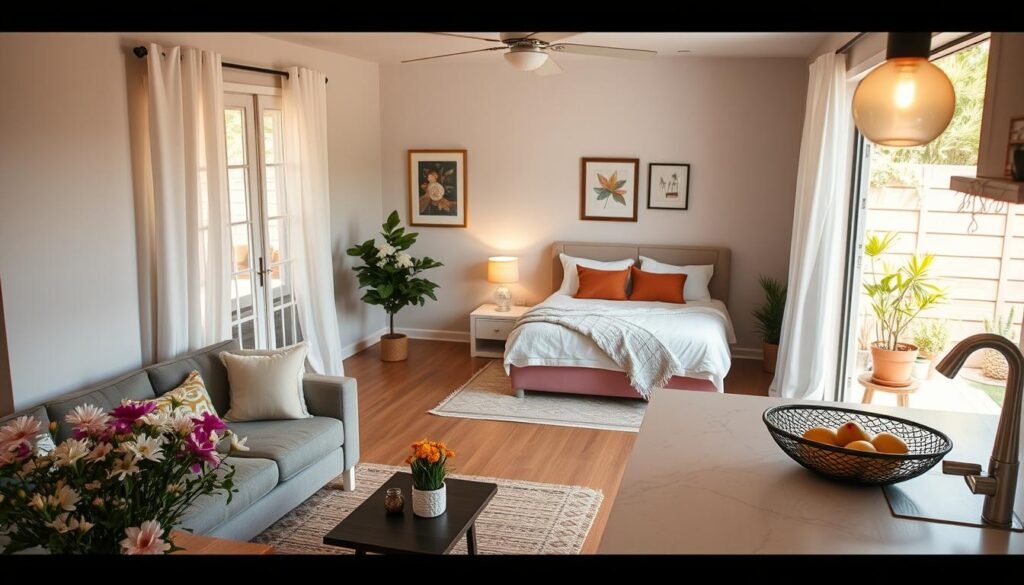
Decluttering and Deep Cleaning
A pristine environment is crucial for hospitality entrepreneurship. Potential guests expect a spotless space that feels fresh and welcoming. Start by:
- Removing personal items and excess clutter
- Conducting a thorough deep clean of all surfaces
- Organizing storage spaces
- Ensuring bathrooms and kitchen are immaculate
“First impressions matter. A clean, well-organized space can significantly boost your booking potential.”
Essential Repairs and Upgrades
Invest in strategic home improvements that enhance guest experience and potentially increase your vacation rental income. Focus on:
- Fixing minor structural issues
- Updating outdated fixtures
- Ensuring all appliances function perfectly
- Adding modern amenities
Enhancing Curb Appeal
The exterior of your property plays a critical role in Airbnb hosting. Create an inviting first impression with:
- Landscaping maintenance
- Fresh paint or clean exterior
- Welcoming entrance design
- Well-lit pathways
Strategic preparation transforms your space from a simple rental to an exceptional guest experience.
Creating an Attractive Listing
Crafting an outstanding Airbnb listing is crucial when you want to earn money rent your house on Airbnb. Your online presentation can make or break your success in the short-term rental business.
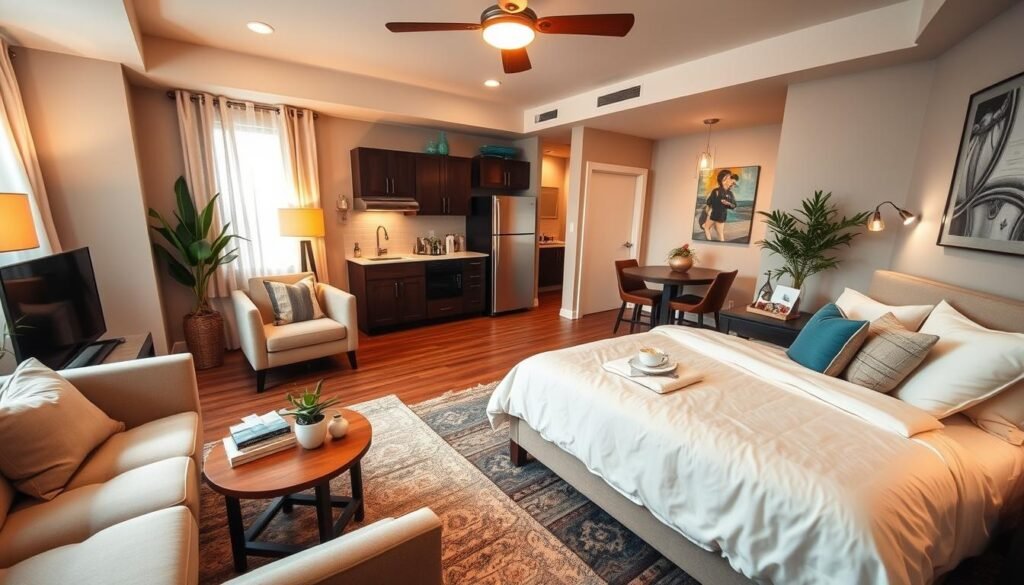
Crafting a Compelling Description
Your property description is your first opportunity to captivate potential guests. Focus on storytelling that highlights unique aspects of your space. Creating engaging content means being authentic and specific about what makes your rental special.
- Describe room layouts and special amenities
- Highlight nearby attractions
- Share local neighborhood insights
- Use friendly, conversational language
Selecting Stunning Photographs
Visual appeal drives bookings in peer-to-peer accommodation. Invest in high-quality, well-lit images that showcase your property’s best features.
- Use natural lighting
- Capture each room from multiple angles
- Highlight unique design elements
- Include exterior and neighborhood shots
Showcasing Unique Property Features
What sets your space apart? Whether it’s a vintage record collection, a stunning city view, or proximity to local attractions, emphasize those distinctive characteristics that make guests choose your listing.
“Great photography and storytelling transform an ordinary space into an irresistible destination.” – Airbnb Hosting Expert
By implementing these strategies, you’ll create a listing that attracts guests and maximizes your potential in the short-term rental business.
Setting Competitive Pricing
Pricing your vacation rental correctly is crucial for maximizing your passive income stream. Strategic pricing can make the difference between a successful Airbnb hosting experience and a lackluster rental performance.
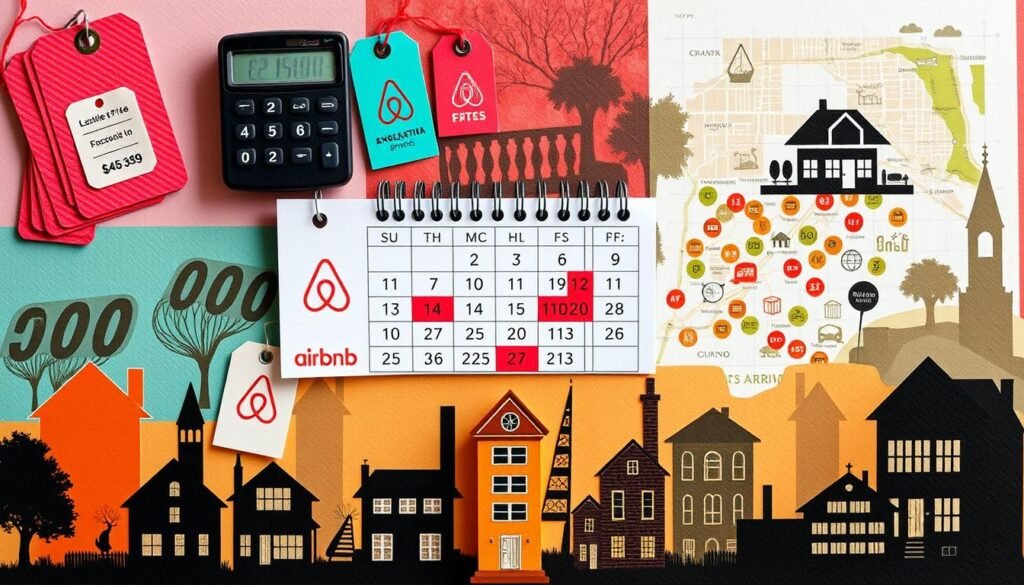
Researching Comparable Listings
Effective Airbnb hosting starts with understanding your local market. Conduct thorough research on similar properties in your area to set competitive rates. Consider these key factors:
- Location proximity
- Property size
- Amenities offered
- Overall property condition
Seasonal Pricing Strategies
Vacation rental income fluctuates throughout the year. Implement dynamic pricing to maximize your earnings during peak seasons and attract guests during slower periods.
| Season | Pricing Strategy | Occupancy Impact |
|---|---|---|
| Peak Season | Increase rates 20-30% | Higher demand |
| Off-Peak Season | Reduce rates 10-15% | Maintain occupancy |
Discounts for Extended Stays
Encourage longer bookings by offering attractive discounts. Guests appreciate value, and hosts benefit from reduced turnover costs. Consider these discount tiers:
- Weekly stays: 10% discount
- Monthly stays: 25% discount
- Last-minute extended bookings: Up to 30% off
“Smart pricing is the key to turning your property into a profitable passive income stream.” – Airbnb Hosting Experts
Remember, pricing is an ongoing process. Regularly review and adjust your rates based on market trends, guest feedback, and your personal hosting goals.
Mastering the Booking Process
Navigating the Airbnb booking process is crucial for anyone looking to earn money rent your house on Airbnb. The platform offers hosts multiple ways to manage reservations and protect their interests while creating a smooth experience for guests.
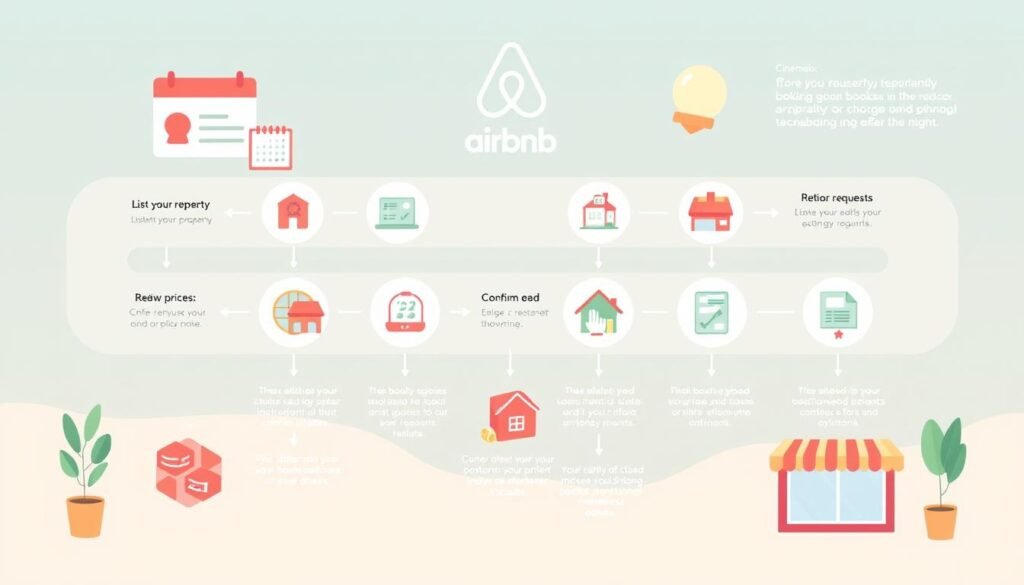
Successful hosts on this home sharing platform understand the nuanced strategies for managing bookings effectively. Let’s explore the key aspects of creating a seamless reservation experience.
Instant Book vs. Request to Book
Airbnb provides two primary booking methods for hosts:
- Instant Book: Allows guests to confirm immediately without host approval
- Request to Book: Gives hosts the opportunity to review and approve each reservation
| Booking Method | Pros | Cons |
|---|---|---|
| Instant Book | Faster reservations | Less screening control |
| Request to Book | More guest screening | Potential booking delays |
Creating Comprehensive House Rules
Establishing clear house rules protects both hosts and guests. Detailed guidelines prevent misunderstandings and set expectations from the start.
- Specify check-in and check-out times
- Outline noise restrictions
- Define guest capacity
- Explain parking and amenity usage
Understanding Airbnb's Policies
“Knowledge of platform policies is the foundation of a successful hosting experience.”
Familiarize yourself with Airbnb’s cancellation policies, payment protection, and host standards to maximize your short-term rental business potential.
Managing Guest Interactions
Successful Airbnb hosting relies on exceptional guest interactions. Mastering communication and hospitality entrepreneurship can transform a simple peer-to-peer accommodation experience into an unforgettable stay.

Communicating Effectively with Guests
Clear and prompt communication is the backbone of great Airbnb hosting. Guests appreciate hosts who respond quickly and provide detailed information about their stay.
- Respond to messages within 24 hours
- Use a friendly and professional tone
- Provide clear check-in instructions
- Anticipate potential guest questions
Handling Special Requests
Flexibility sets successful hosts apart in the peer-to-peer accommodation market. Guests often have unique needs that require creative solutions.
| Request Type | Recommended Action |
|---|---|
| Early Check-In | Accommodate when possible, charge minimal fee |
| Late Checkout | Offer flexible options based on next booking |
| Special Dietary Needs | Provide local restaurant recommendations |
Providing Local Recommendations
Exceptional Airbnb hosting goes beyond providing a place to stay. Local insights can significantly enhance guest experience.
“The best hosts are local experts who make guests feel connected to the community.” – Airbnb Superhost Guide
- Create a curated local guide
- Recommend hidden gem restaurants
- Share insider tips about neighborhood attractions
- Provide transportation and parking advice
By focusing on personalized interactions, hosts can elevate their Airbnb hosting from transactional to transformational, creating memorable experiences that drive positive reviews and repeat bookings.
Ensuring a Safe and Secure Stay
Safety is paramount when you earn money rent your house on Airbnb. Protecting both your property and your guests creates a trustworthy environment for your short-term rental business. Implementing robust security measures can significantly enhance guest confidence and your vacation rental income.
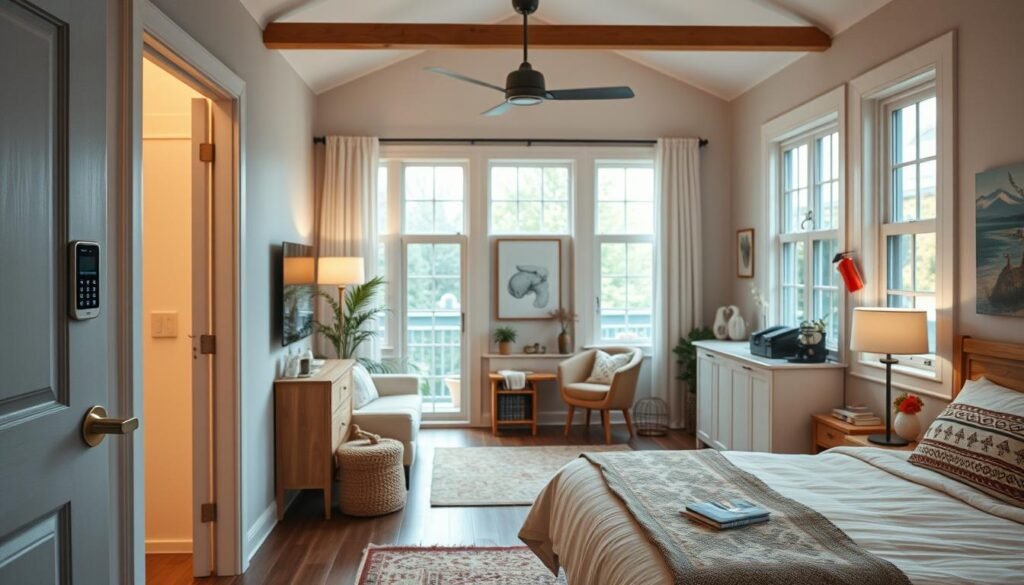
Enhancing Home Security
Securing your property requires strategic planning and smart technology. Consider these key security investments:
- Install smart locks with unique entry codes for each guest
- Set up exterior motion-sensor lighting
- Use security cameras in common areas (respecting privacy laws)
- Implement a comprehensive alarm system
Safety Features to Include
Critical safety features can protect both guests and your property. A well-prepared rental demonstrates professionalism in your short-term rental business strategy.
| Safety Feature | Purpose |
|---|---|
| First Aid Kit | Emergency medical preparedness |
| Fire Extinguisher | Immediate fire response |
| Carbon Monoxide Detector | Toxic gas protection |
| Smoke Alarms | Early fire detection |
Airbnb's Insurance Coverage
Understanding Airbnb’s Host Protection Program is crucial for peace of mind. The platform offers primary liability coverage up to $1 million, which helps protect hosts during potential incidents. This coverage can be a significant reassurance when you earn money renting your house on Airbnb.
“Safety isn’t expensive, it’s priceless” – Unknown
By prioritizing security, you create a welcoming environment that encourages positive reviews and repeat bookings in your vacation rental income strategy.
Navigating Legal Considerations
Launching a successful short-term rental business requires more than just creating an attractive listing. Airbnb hosting involves critical legal considerations that can impact your supplemental income source. Understanding local regulations is crucial to protecting your investment and avoiding potential legal complications.
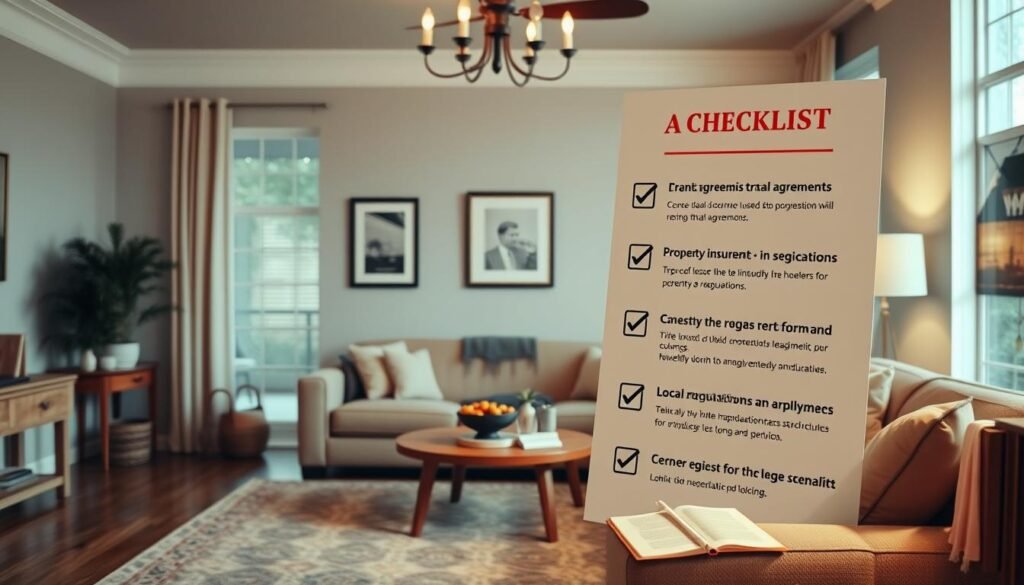
Before diving into Airbnb hosting, you must thoroughly research the legal landscape of short-term rentals in your specific area. Local regulations can vary significantly between cities and neighborhoods.
Understanding Local Laws and Regulations
Each municipality has unique requirements for short-term rental operations. Some key areas to investigate include:
- Zoning restrictions
- Residential rental limitations
- Neighborhood association rules
- Occupancy restrictions
Acquiring Necessary Permits
Many jurisdictions require specific permits for Airbnb hosting. The permitting process typically involves:
- Contacting local municipal offices
- Submitting required documentation
- Paying applicable registration fees
- Passing potential property inspections
Compliance with Tax Obligations
Proper tax reporting is essential for your supplemental income source. Different locations have varying tax requirements for short-term rental businesses.
| Tax Consideration | Action Required |
|---|---|
| Income Reporting | Report all Airbnb earnings on tax returns |
| Sales Tax | Collect and remit local sales taxes |
| Occupancy Tax | Understand local occupancy tax requirements |
“Knowledge of local regulations is the foundation of a successful and compliant Airbnb hosting business.” – Real Estate Legal Expert
Consulting with a local real estate attorney can provide personalized guidance for navigating the complex legal landscape of short-term rentals.
Learning about Host Standards
Successful Airbnb hosting requires more than just offering a space. It demands a commitment to exceptional hospitality entrepreneurship that transforms your peer-to-peer accommodation into a standout experience. Understanding and exceeding Airbnb’s hosting standards is crucial for creating memorable guest interactions.
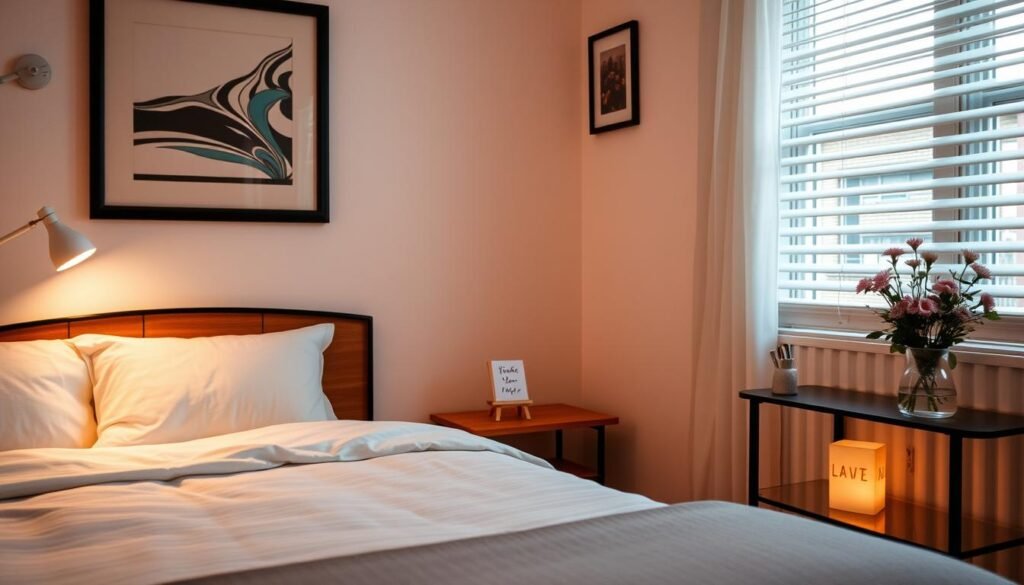
Airbnb's Core Hosting Guidelines
Airbnb has established clear expectations for hosts to ensure quality and consistency across its platform. These standards focus on several key areas:
- Cleanliness and maintenance of the space
- Accurate and detailed listing descriptions
- Prompt and professional communication
- Adherence to house rules and local regulations
Understanding Guest Reviews and Ratings
In the world of peer-to-peer accommodation, guest reviews serve as your digital reputation. A robust review profile can significantly impact your booking potential. Guests typically evaluate hosts based on:
- Accuracy of listing description
- Cleanliness
- Communication quality
- Location value
- Overall experience
“Your success in Airbnb hosting is directly proportional to the quality of experience you provide.” – Airbnb Host Community
Mastering Feedback Response
Effective hospitality entrepreneurship involves gracefully handling both positive and negative feedback. When responding to reviews:
- Be timely and professional
- Express gratitude for positive comments
- Address concerns constructively in negative reviews
- Show willingness to improve
By consistently meeting and exceeding Airbnb’s hosting standards, you’ll create a reputation that attracts more guests and builds long-term success in the competitive peer-to-peer accommodation market.
Marketing Your Airbnb Listing
Maximizing your vacation rental income requires strategic marketing that goes beyond simply listing your property. The short-term rental business demands creative approaches to attract potential guests and stand out in a competitive marketplace.

Promoting on Social Media
Social media platforms offer powerful tools to earn money rent your house on Airbnb. Create engaging content that showcases your unique property and local attractions. Develop a consistent posting strategy across platforms like:
- Instagram (highlight stunning property photos)
- Facebook (share local event recommendations)
- Pinterest (create travel-themed boards)
- TikTok (share quick property tours)
Utilizing SEO Strategies
Optimize your Airbnb listing with strategic keywords and compelling descriptions. Search engine optimization can significantly increase your visibility and booking potential. Focus on:
- Craft detailed, keyword-rich descriptions
- Use high-quality, professional photographs
- Highlight unique property features
- Regularly update listing information
Collaborating with Local Businesses
Build strong local partnerships to enhance your guest experience and marketing reach. Consider creating strategic collaborations with:
| Business Type | Potential Collaboration | Marketing Benefit |
|---|---|---|
| Local Restaurants | Exclusive Guest Discounts | Increased Attraction |
| Tour Operators | Bundled Experience Packages | Added Value Proposition |
| Rental Car Companies | Special Booking Rates | Comprehensive Guest Services |
“Success in the short-term rental business is about creating memorable experiences, not just providing a place to stay.” – Airbnb Superhost
Managing Finances Smartly
Transforming your property into a vacation rental income generator requires strategic financial management. Successful Airbnb hosts understand that tracking expenses and maintaining clear financial records are crucial to developing a sustainable passive income stream.
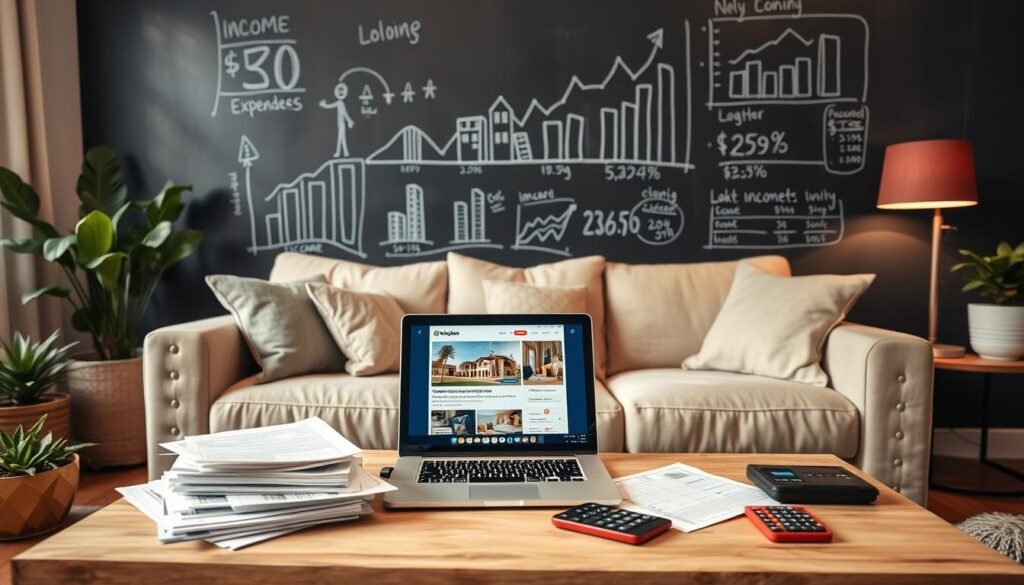
Effective financial management begins with creating a dedicated system for monitoring your supplemental income source. Professional hosts recommend several key strategies to keep your Airbnb finances organized and transparent.
Tracking Expenses and Income
Maintaining detailed financial records is essential for maximizing your vacation rental income. Create a comprehensive spreadsheet that captures:
- Cleaning and maintenance costs
- Utility expenses
- Repair and upgrade investments
- Monthly rental revenue
Setting Up Separate Accounts
Separate your Airbnb finances from personal accounts to simplify tracking and streamline your money management strategies. Open a dedicated business checking account specifically for your rental income and expenses.
“Treat your Airbnb as a business, and your finances will reflect that professionalism.” – Successful Airbnb Host
Using Accounting Software
Leverage technology to simplify financial tracking. Modern accounting software can help you:
- Automatically categorize expenses
- Generate financial reports
- Track tax-deductible items
- Monitor cash flow
By implementing these financial management techniques, you’ll transform your Airbnb from a simple rental into a well-organized, profitable passive income stream.
Analyzing Performance Metrics
Tracking performance is crucial when you earn money renting your house on Airbnb. Successful short-term rental business owners understand that data-driven insights can dramatically improve their hosting strategy.
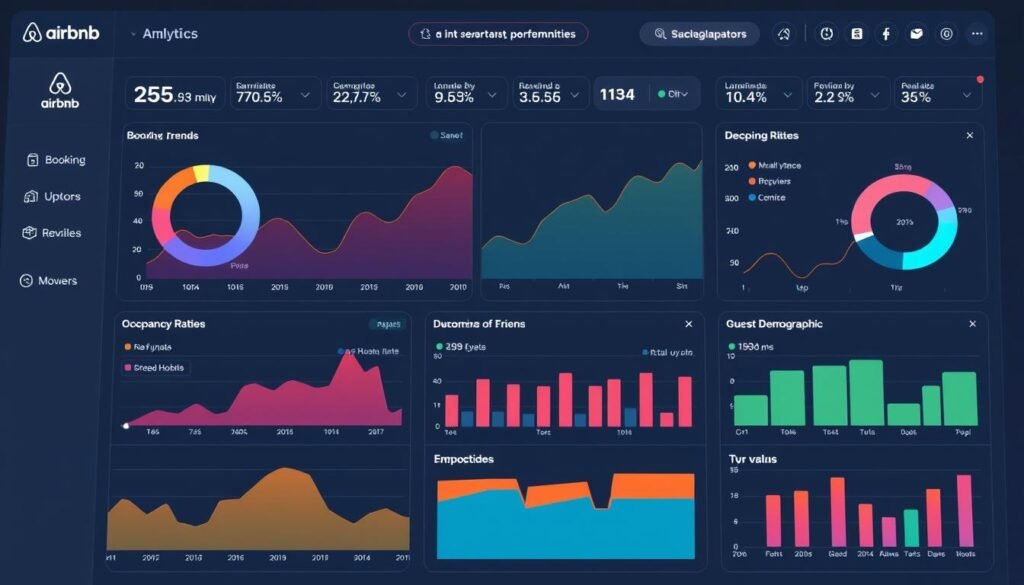
Monitoring Occupancy Rates
Occupancy rates reveal the health of your Airbnb hosting venture. By carefully tracking how often your property is booked, you can identify peak seasons and potential improvement areas.
- Calculate monthly occupancy percentage
- Compare rates across different seasons
- Identify low-performing periods
Financial Performance Analysis
Detailed financial tracking helps maximize your earnings from short-term rental business. Breaking down income and expenses provides clear insights into profitability.
| Metric | Monthly Tracking | Annual Impact |
|---|---|---|
| Gross Revenue | $2,500 | $30,000 |
| Operating Expenses | $800 | $9,600 |
| Net Profit | $1,700 | $20,400 |
Adjusting Strategies Based on Data
Airbnb hosting success depends on your ability to adapt. Use performance metrics to make informed decisions about pricing, marketing, and property improvements.
“Numbers don’t lie – they guide your path to successful hosting.” – Airbnb Superhost
Smart hosts continuously analyze their data, making strategic adjustments to increase bookings and optimize revenue in the competitive short-term rental market.
Building a Repeat Guest Strategy
Successful vacation rental income relies on creating memorable experiences that transform first-time guests into loyal customers. Hospitality entrepreneurship in the peer-to-peer accommodation market requires strategic approaches to guest retention and engagement.
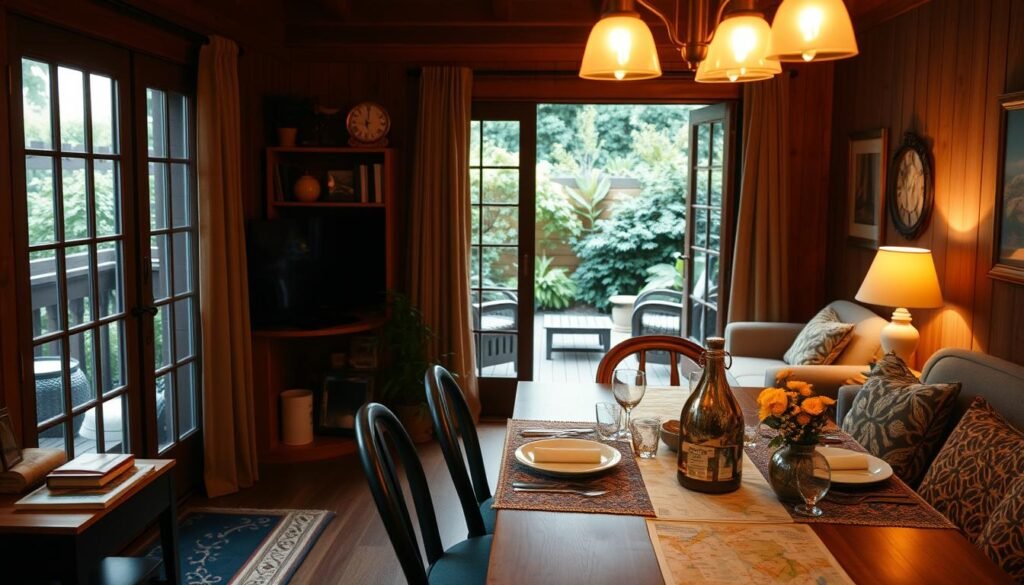
Cultivating a loyal guest base can significantly boost your rental performance and reduce marketing costs. Smart hosts understand that returning guests are the backbone of sustainable vacation rental businesses.
Creating a Loyalty Program
Design a simple yet effective loyalty program that incentivizes repeat bookings. Consider these strategies:
- Offer a 10% discount for guests who book a second stay
- Provide complimentary welcome amenities for returning guests
- Create a points-based system for accumulated stays
Sending Follow-Up Promotions
Maintain communication with past guests through targeted promotions. Use personalized email campaigns that highlight:
- Seasonal special rates
- New property upgrades
- Exclusive booking windows
Encouraging Reviews and Referrals
| Review Strategy | Referral Incentive |
|---|---|
| Send gentle reminder emails | Offer $50 credit for successful referrals |
| Make review process simple | Create shareable referral links |
| Respond to all reviews professionally | Track and reward referral sources |
“The key to success in peer-to-peer accommodation is transforming guests into brand advocates.” – Airbnb Superhost Network
By implementing these strategies, hosts can create a robust repeat guest ecosystem that drives consistent vacation rental income and establishes a strong reputation in the hospitality entrepreneurship landscape.
Scaling Your Airbnb Business
Growing your short-term rental business requires strategic planning and careful expansion. Transforming your Airbnb rental into a robust passive income stream involves multiple approaches to maximize your earning potential.

Expanding Your Property Portfolio
When you earn money rent your house on Airbnb successfully, the next logical step is adding more listings. This expansion strategy can significantly boost your passive income stream.
- Purchase additional properties in high-demand locations
- Partner with other homeowners for shared management
- Leverage existing property equity for new investments
Property Management Services
Professional management can streamline your short-term rental business, allowing you to scale without becoming overwhelmed.
| Service Type | Cost Range | Key Benefits |
|---|---|---|
| Full-Service Management | 8-20% of rental income | Complete property oversight |
| Partial Management | 4-10% of rental income | Selective support services |
Long-Term Rental Opportunities
Diversifying your rental strategy can provide stability and consistent income. Consider mixing short-term and long-term rental approaches to optimize your real estate investment.
“Successful real estate investors never rely on a single income stream.” – Real Estate Investment Experts
- Evaluate market demand for long-term rentals
- Understand local housing regulations
- Calculate potential returns compared to short-term rentals
Staying Updated on Airbnb Trends
Successful Airbnb hosting requires continuous learning and staying ahead of industry developments. The home sharing platform evolves rapidly, making it crucial for hospitality entrepreneurs to remain informed about the latest trends and strategies.

Keeping your finger on the pulse of Airbnb hosting can significantly enhance your performance and competitive edge. Here are key methods to stay current:
Following Industry News
Reliable sources can provide valuable insights into Airbnb hosting trends. Consider these channels:
- Airbnb official blog
- Travel and hospitality industry websites
- Specialized short-term rental podcasts
- Professional hosting forums
Attending Host Meetups
Networking plays a critical role in expanding your knowledge. Local and virtual host meetups offer unique opportunities to:
- Share experiences with other hosts
- Learn best practices
- Discover emerging market trends
Engaging with Online Communities
Digital platforms provide rich resources for Airbnb hosting knowledge. Explore these online spaces:
| Platform | Benefits |
|---|---|
| Facebook Groups | Peer advice and support |
| Reddit Communities | Candid discussions and tips |
| LinkedIn Professional Networks | Industry connections and insights |
“Stay curious, stay connected, and never stop learning in the dynamic world of hospitality entrepreneurship.”
Continuous education is the cornerstone of success in the ever-changing landscape of Airbnb hosting.
Conclusion: Making Money on Airbnb
Transforming your property into a vacation rental can be an exciting path to generating supplemental income source. The world of Airbnb hosting offers remarkable opportunities for homeowners looking to earn money rent your house on Airbnb. By implementing the strategies discussed throughout this guide, you can create a successful and profitable rental experience.
Key success factors include understanding market dynamics, preparing your space professionally, and delivering exceptional guest experiences. Your vacation rental income potential depends on careful planning, strategic pricing, and consistent attention to detail. Strategic marketing techniques and proactive property management can significantly enhance your earning potential.
The short-term rental market continues to grow, presenting innovative ways for property owners to generate additional revenue. Learning platform regulations, maintaining high-quality standards, and remaining adaptable will position you for long-term success. Start small, learn from each booking, and progressively refine your hosting approach to maximize your Airbnb potential.
Embarking on your Airbnb hosting journey requires commitment, creativity, and continuous learning. With dedication and the right approach, you can transform your property into a profitable and rewarding venture that provides both financial benefits and exciting personal experiences.
FAQ
How much money can I realistically earn by renting my house on Airbnb?
Earnings vary depending on location, property type, and seasonality. On average, hosts can earn between 0 to ,000 per month. Factors like proximity to tourist attractions, local events, and property amenities significantly impact potential income. Urban areas and popular vacation destinations typically generate higher rental revenues.
Do I need special insurance to host on Airbnb?
Airbnb provides host protection insurance up to
FAQ
How much money can I realistically earn by renting my house on Airbnb?
Earnings vary depending on location, property type, and seasonality. On average, hosts can earn between $500 to $3,000 per month. Factors like proximity to tourist attractions, local events, and property amenities significantly impact potential income. Urban areas and popular vacation destinations typically generate higher rental revenues.
Do I need special insurance to host on Airbnb?
Airbnb provides host protection insurance up to $1 million, but it’s recommended to also obtain additional short-term rental insurance from your homeowner’s insurance provider. This extra coverage ensures comprehensive protection for your property and potential liability situations.
What are the initial costs of preparing my home for Airbnb rentals?
Initial preparation costs can range from $200 to $1,500, including deep cleaning, minor repairs, purchasing guest amenities, and potentially upgrading furnishings. Investments might include quality linens, basic kitchen supplies, comfortable bedding, and creating an appealing, welcoming space for guests.
How do taxes work for Airbnb rental income?
Airbnb rental income is taxable, and you’re required to report earnings on your tax return. Depending on your location, you may need to collect and remit local occupancy taxes. Keeping detailed records of income and expenses can help maximize potential tax deductions related to your rental activities.
Is it safe to rent out my home to strangers?
Airbnb provides multiple safety features, including guest verification processes, secure messaging platforms, and review systems. Hosts can also implement additional safety measures like smart locks, security cameras, and comprehensive house rules to enhance property protection and guest screening.
How often do I need to be available for guest communications?
Successful hosts typically respond within 1-2 hours of guest inquiries. While immediate availability isn’t mandatory, prompt and professional communication is crucial for maintaining high ratings and securing bookings. Many hosts use mobile apps to manage communications efficiently.
What local regulations should I be aware of before hosting?
Local regulations vary significantly between cities and municipalities. Some areas require specific permits, have occupancy limits, or restrict short-term rentals. Always check with local government offices, homeowners’ associations, and review zoning laws before listing your property on Airbnb.
How can I make my Airbnb listing stand out?
Create a compelling listing with high-quality photos, detailed descriptions, unique amenities, and competitive pricing. Highlight special features of your property, provide local area recommendations, and maintain an immaculately clean and well-maintained space to attract more potential guests.
Do I need to be a local host to rent my property?
No, many successful hosts use property management services or have local co-hosts who can handle day-to-day operations. Technology and professional services make remote hosting entirely feasible, allowing property owners to generate income even if they don’t live near the rental.
How quickly can I start earning money after listing my property?
After creating a complete profile and listing, hosts can potentially receive bookings within a few days to weeks. Initial earnings depend on factors like location, pricing, property appeal, and local demand. Building positive reviews and maintaining an attractive listing helps accelerate booking rates.
What are the initial costs of preparing my home for Airbnb rentals?
Initial preparation costs can range from 0 to
FAQ
How much money can I realistically earn by renting my house on Airbnb?
Earnings vary depending on location, property type, and seasonality. On average, hosts can earn between $500 to $3,000 per month. Factors like proximity to tourist attractions, local events, and property amenities significantly impact potential income. Urban areas and popular vacation destinations typically generate higher rental revenues.
Do I need special insurance to host on Airbnb?
Airbnb provides host protection insurance up to $1 million, but it’s recommended to also obtain additional short-term rental insurance from your homeowner’s insurance provider. This extra coverage ensures comprehensive protection for your property and potential liability situations.
What are the initial costs of preparing my home for Airbnb rentals?
Initial preparation costs can range from $200 to $1,500, including deep cleaning, minor repairs, purchasing guest amenities, and potentially upgrading furnishings. Investments might include quality linens, basic kitchen supplies, comfortable bedding, and creating an appealing, welcoming space for guests.
How do taxes work for Airbnb rental income?
Airbnb rental income is taxable, and you’re required to report earnings on your tax return. Depending on your location, you may need to collect and remit local occupancy taxes. Keeping detailed records of income and expenses can help maximize potential tax deductions related to your rental activities.
Is it safe to rent out my home to strangers?
Airbnb provides multiple safety features, including guest verification processes, secure messaging platforms, and review systems. Hosts can also implement additional safety measures like smart locks, security cameras, and comprehensive house rules to enhance property protection and guest screening.
How often do I need to be available for guest communications?
Successful hosts typically respond within 1-2 hours of guest inquiries. While immediate availability isn’t mandatory, prompt and professional communication is crucial for maintaining high ratings and securing bookings. Many hosts use mobile apps to manage communications efficiently.
What local regulations should I be aware of before hosting?
Local regulations vary significantly between cities and municipalities. Some areas require specific permits, have occupancy limits, or restrict short-term rentals. Always check with local government offices, homeowners’ associations, and review zoning laws before listing your property on Airbnb.
How can I make my Airbnb listing stand out?
Create a compelling listing with high-quality photos, detailed descriptions, unique amenities, and competitive pricing. Highlight special features of your property, provide local area recommendations, and maintain an immaculately clean and well-maintained space to attract more potential guests.
Do I need to be a local host to rent my property?
No, many successful hosts use property management services or have local co-hosts who can handle day-to-day operations. Technology and professional services make remote hosting entirely feasible, allowing property owners to generate income even if they don’t live near the rental.
How quickly can I start earning money after listing my property?
After creating a complete profile and listing, hosts can potentially receive bookings within a few days to weeks. Initial earnings depend on factors like location, pricing, property appeal, and local demand. Building positive reviews and maintaining an attractive listing helps accelerate booking rates.
How do taxes work for Airbnb rental income?
Airbnb rental income is taxable, and you’re required to report earnings on your tax return. Depending on your location, you may need to collect and remit local occupancy taxes. Keeping detailed records of income and expenses can help maximize potential tax deductions related to your rental activities.
Is it safe to rent out my home to strangers?
Airbnb provides multiple safety features, including guest verification processes, secure messaging platforms, and review systems. Hosts can also implement additional safety measures like smart locks, security cameras, and comprehensive house rules to enhance property protection and guest screening.
How often do I need to be available for guest communications?
Successful hosts typically respond within 1-2 hours of guest inquiries. While immediate availability isn’t mandatory, prompt and professional communication is crucial for maintaining high ratings and securing bookings. Many hosts use mobile apps to manage communications efficiently.
What local regulations should I be aware of before hosting?
Local regulations vary significantly between cities and municipalities. Some areas require specific permits, have occupancy limits, or restrict short-term rentals. Always check with local government offices, homeowners’ associations, and review zoning laws before listing your property on Airbnb.
How can I make my Airbnb listing stand out?
Create a compelling listing with high-quality photos, detailed descriptions, unique amenities, and competitive pricing. Highlight special features of your property, provide local area recommendations, and maintain an immaculately clean and well-maintained space to attract more potential guests.
Do I need to be a local host to rent my property?
No, many successful hosts use property management services or have local co-hosts who can handle day-to-day operations. Technology and professional services make remote hosting entirely feasible, allowing property owners to generate income even if they don’t live near the rental.
How quickly can I start earning money after listing my property?
After creating a complete profile and listing, hosts can potentially receive bookings within a few days to weeks. Initial earnings depend on factors like location, pricing, property appeal, and local demand. Building positive reviews and maintaining an attractive listing helps accelerate booking rates.


